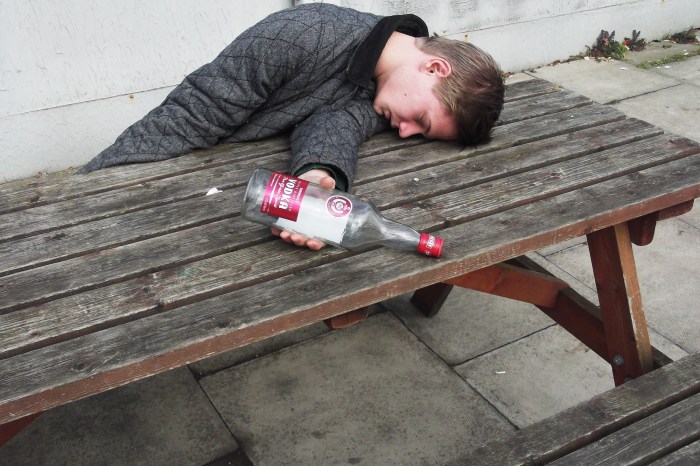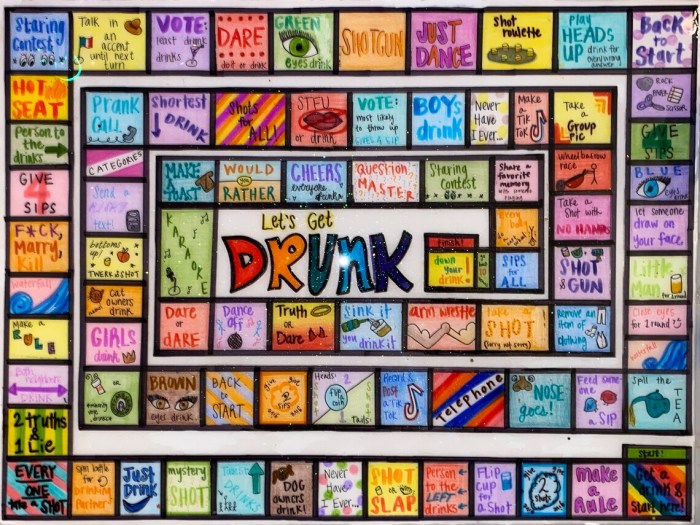Blackout or get drunk trying game – The “blackout or get drunk trying” game, a dangerous and potentially life-threatening activity, has gained alarming popularity among certain demographics. This game, fueled by excessive alcohol consumption, poses significant risks to both physical and mental health, raising ethical concerns and prompting the need for prevention and intervention strategies.
This comprehensive analysis delves into the game’s rules, objectives, and associated risks, exploring its social and cultural context and the motivations behind its participation. It also examines the short-term and long-term health implications of excessive alcohol consumption, detailing the potential physical, mental, and emotional consequences.
Game Overview: Blackout Or Get Drunk Trying Game

The “blackout or get drunk trying” game is a dangerous and potentially harmful drinking game that involves consuming excessive amounts of alcohol in a short period of time. The objective of the game is to get as drunk as possible, often to the point of blackout, in order to win.
Participants may engage in dangerous behaviors such as binge drinking, rapid drinking, and mixing different types of alcohol, which can lead to serious health risks and even death.
The consequences of playing this game can be severe, including alcohol poisoning, liver damage, brain damage, and even death. In addition, participating in this game can lead to other negative outcomes such as impaired judgment, risky sexual behavior, and legal problems.
Social and Cultural Context
The “blackout or get drunk trying” game is popular among young people, particularly college students. The game is often played at parties or social gatherings, and it is often seen as a way to have fun and let loose. However, the game can quickly become dangerous, and it is important to be aware of the risks involved.
There are a number of reasons why people participate in this game. Some people may feel pressure to drink in order to fit in with their peers. Others may drink to cope with stress or anxiety. Still others may simply enjoy the feeling of being drunk.
Health Implications
Excessive alcohol consumption can have a number of negative health consequences, both in the short term and the long term. In the short term, excessive drinking can lead to alcohol poisoning, liver damage, and brain damage. It can also impair judgment, increase the risk of accidents, and lead to risky sexual behavior.
In the long term, excessive drinking can lead to a number of health problems, including heart disease, stroke, cancer, and liver cirrhosis. It can also damage the brain and nervous system, and it can lead to mental health problems such as depression and anxiety.
Prevention and Intervention, Blackout or get drunk trying game
There are a number of things that can be done to prevent the “blackout or get drunk trying” game from being played. Parents and educators can talk to young people about the dangers of excessive drinking. They can also help young people develop healthy coping mechanisms for dealing with stress and anxiety.
Colleges and universities can implement policies that discourage excessive drinking. These policies may include limiting the number of drinks that students can purchase at a time, banning alcohol from certain events, and providing safe transportation options for students who have been drinking.
There are also a number of resources available for individuals who are struggling with alcohol abuse. These resources include support groups, counseling, and treatment programs.
Ethical Considerations
There are a number of ethical considerations that should be taken into account when discussing the “blackout or get drunk trying” game. First, it is important to remember that this game can be dangerous and even deadly. Second, it is important to respect the autonomy of individuals who choose to drink alcohol.
However, it is also important to protect those who are vulnerable to the harmful effects of alcohol.
Ultimately, the decision of whether or not to participate in the “blackout or get drunk trying” game is a personal one. However, it is important to be aware of the risks involved and to make an informed decision.
Alternative Activities
There are a number of alternative activities that can be enjoyed without excessive alcohol consumption. These activities include:
- Going to a movie
- Playing a game
- Going for a walk or hike
- Spending time with friends or family
- Reading a book
- Listening to music
Common Queries
What are the potential health risks of participating in the “blackout or get drunk trying” game?
Excessive alcohol consumption can lead to short-term risks such as alcohol poisoning, respiratory depression, and injuries due to impaired judgment. Long-term risks include liver damage, heart disease, stroke, and mental health disorders.
Why do people participate in the “blackout or get drunk trying” game?
Motivations vary, but common reasons include peer pressure, a desire for social acceptance, and a misguided attempt to cope with stress or boredom.
What are some alternative activities that promote responsible drinking or social interaction without excessive alcohol consumption?
Alternative activities include board games, card games, sports, volunteering, and attending social events where alcohol is not the main focus.

